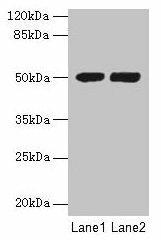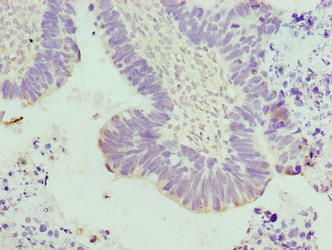| UniProt Protein Function: | TUBA1A: Tubulin is the major constituent of microtubules. It binds two moles of GTP, one at an exchangeable site on the beta chain and one at a non-exchangeable site on the alpha-chain. Dimer of alpha and beta chains. Expressed at a high level in fetal brain. Belongs to the tubulin family.Protein type: Motility/polarity/chemotaxis; CytoskeletalChromosomal Location of Human Ortholog: 12q13.12Cellular Component: microtubule; recycling endosome; cytoplasmic microtubule; cytosol; nucleusMolecular Function: GTPase activity; protein domain specific binding; protein binding; GTP binding; structural constituent of cytoskeleton; structural molecule activityBiological Process: protein polymerization; 'de novo' posttranslational protein folding; cellular protein metabolic process; protein folding; cell division; organelle organization and biogenesis; cytoskeleton-dependent intracellular transport; mitotic cell cycle; G2/M transition of mitotic cell cycle; microtubule-based processDisease: Lissencephaly 3 |
| UniProt Protein Details: | |
| NCBI Summary: | Microtubules of the eukaryotic cytoskeleton perform essential and diverse functions and are composed of a heterodimer of alpha and beta tubulins. The genes encoding these microtubule constituents belong to the tubulin superfamily, which is composed of six distinct families. Genes from the alpha, beta and gamma tubulin families are found in all eukaryotes. The alpha and beta tubulins represent the major components of microtubules, while gamma tubulin plays a critical role in the nucleation of microtubule assembly. There are multiple alpha and beta tubulin genes, which are highly conserved among species. This gene encodes alpha tubulin and is highly similar to the mouse and rat Tuba1 genes. Northern blotting studies have shown that the gene expression is predominantly found in morphologically differentiated neurologic cells. This gene is one of three alpha-tubulin genes in a cluster on chromosome 12q. Mutations in this gene cause lissencephaly type 3 (LIS3) - a neurological condition characterized by microcephaly, mental retardation, and early-onset epilepsy and caused by defective neuronal migration. Alternative splicing results in multiple transcript variants encoding distinct isoforms. [provided by RefSeq, Jul 2012] |
| UniProt Code: | Q6PEY2 |
| NCBI GenInfo Identifier: | 55977864 |
| NCBI Gene ID: | 7846 |
| NCBI Accession: | Q71U36.1 |
| UniProt Secondary Accession: | Q6PEY2,P68363, Q9BQE3, Q13748, Q6PEY2 |
| UniProt Related Accession: | Q6PEY2,Q71U36 |
| Molecular Weight: | 46,297 Da |
| NCBI Full Name: | Tubulin alpha-1A chain |
| NCBI Synonym Full Names: | tubulin, alpha 1a |
| NCBI Official Symbol: | TUBA1A |
| NCBI Official Synonym Symbols: | LIS3; TUBA3; B-ALPHA-1 |
| NCBI Protein Information: | tubulin alpha-1A chain; hum-a-tub1; hum-a-tub2; tubulin B-alpha-1; tubulin alpha-3 chain; tubulin, alpha, brain-specific |
| UniProt Protein Name: | Tubulin alpha-1A chain |
| UniProt Synonym Protein Names: | Alpha-tubulin 3; Tubulin B-alpha-1; Tubulin alpha-3 chain |
| Protein Family: | |
| UniProt Gene Name: | TUBA1A |
| UniProt Entry Name: | TBA1A_HUMAN |








